P4
- 5G negro
- 5G blanco
- 4G LTE-A Pro+
- Voz profesional 4G LTE-A
- 4G LTE-A Pro Wi-Fi 6
- 4G LTE-A Pro
- Voz 4G LTE-A
- 4G LTE-A Negro
- 4G LTE-A Blanco
- 4G Voz Wi-Fi 5
- 4G con Det. HORMIGA.
- 4G Wi-Fi 5 Negro
- 4G Wi-Fi 5 Blanco
- 4G Voz Wi-Fi 4
- 4G negro
- 4G blanco
- 4G mini
- Exterior 4G LTE-A Wi-Fi 5
- Wifi 4G exterior 5
- Wifi 4G exterior 4
- Wifi móvil





Qualcomm X62 5G Modem
5G. Max 3.4 Gbps Download.
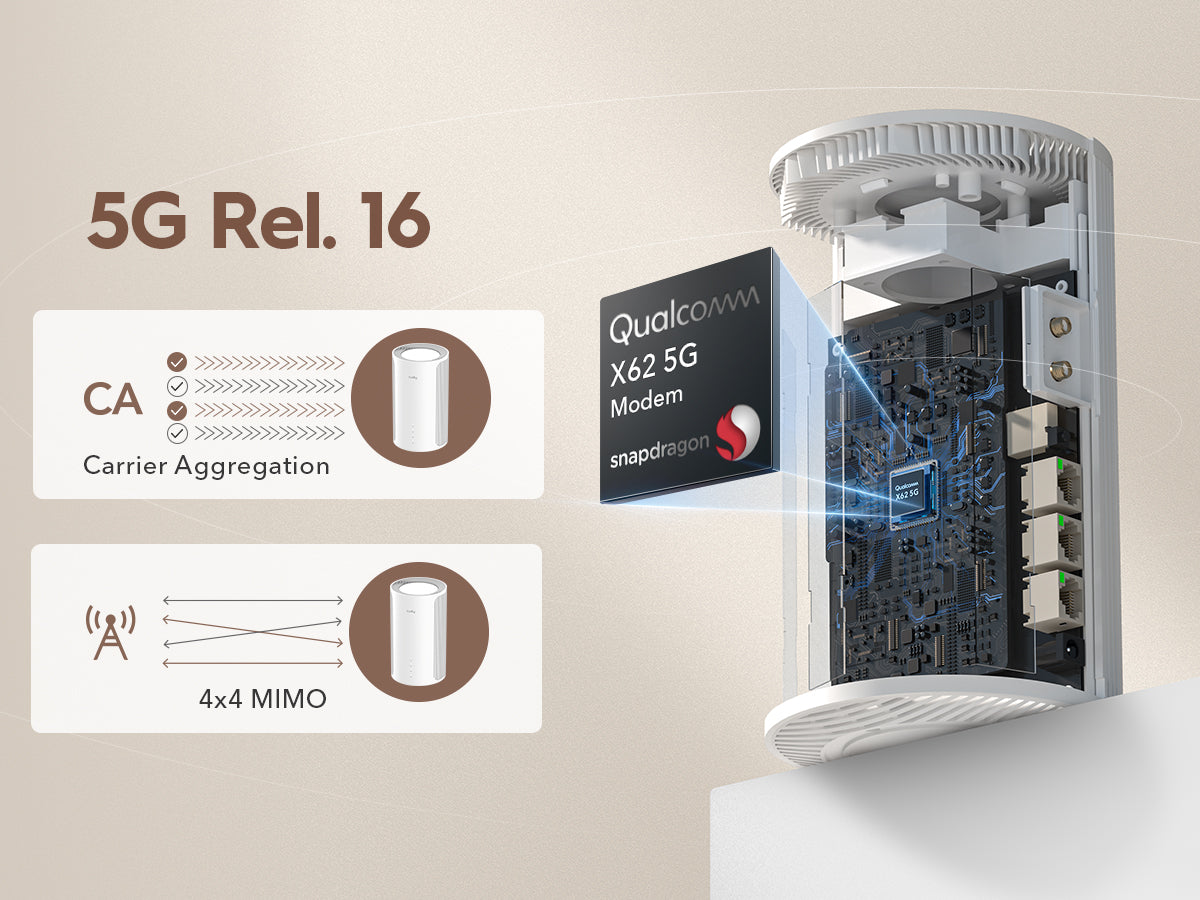
Qualcomm X62 5G Modem
5G. Max 3.4 Gbps Download.

Qualcomm Wi-Fi 6 Chipset
150% Faster Wi-Fi Speed
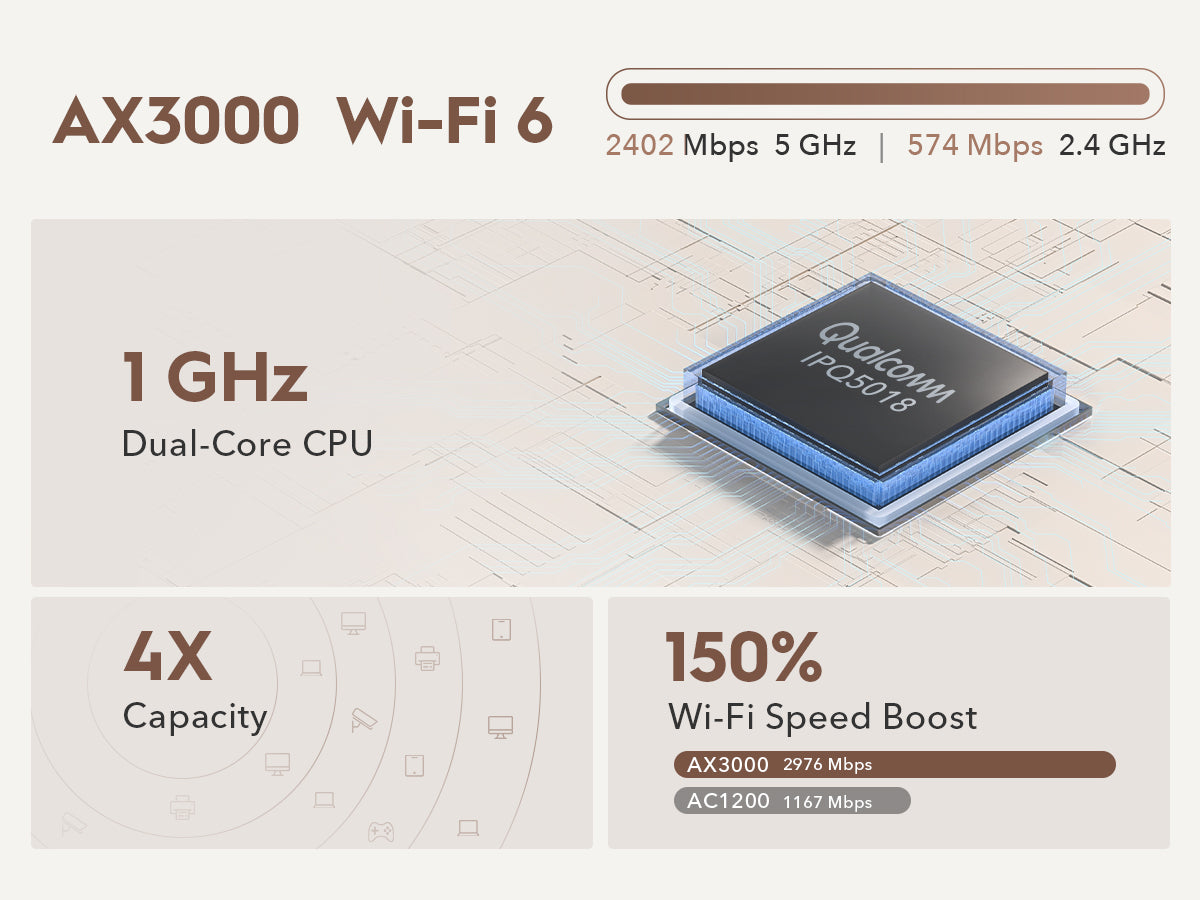
Qualcomm Wi-Fi 6 Chipset
150% Faster Wi-Fi Speed
Plug in a SIM Card to Enjoy the Network

Home

Automobile

Surveillance

Booth

Multiple Ports
Abundant Wired Connectivity
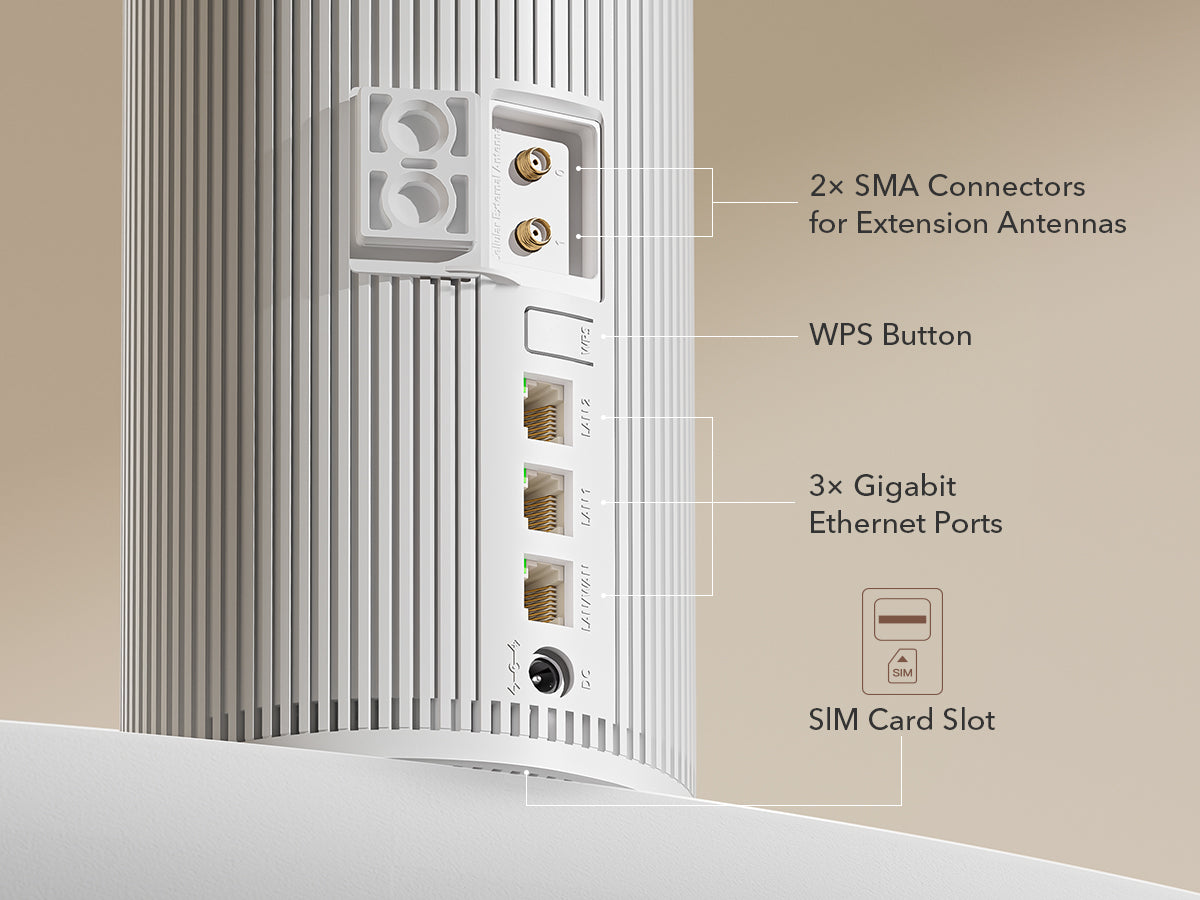
Multiple Ports
Abundant Wired Connectivity
Tools for a Customized Network
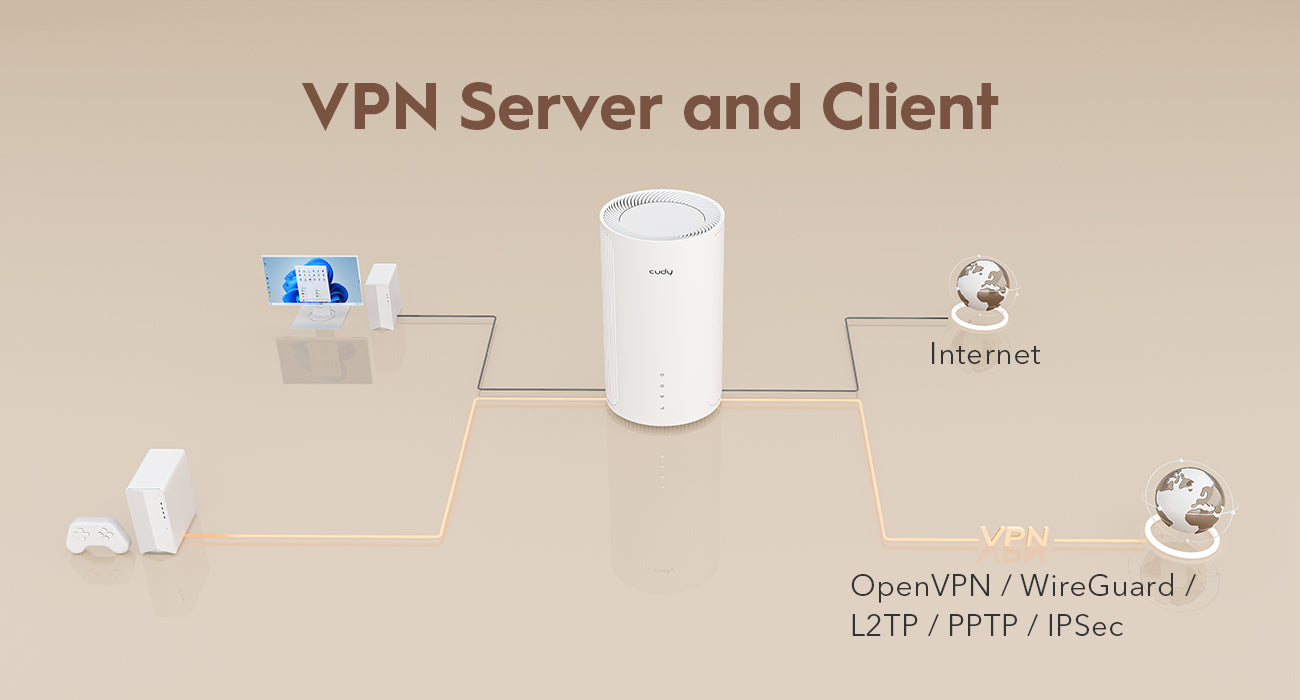
Secure VPN Access
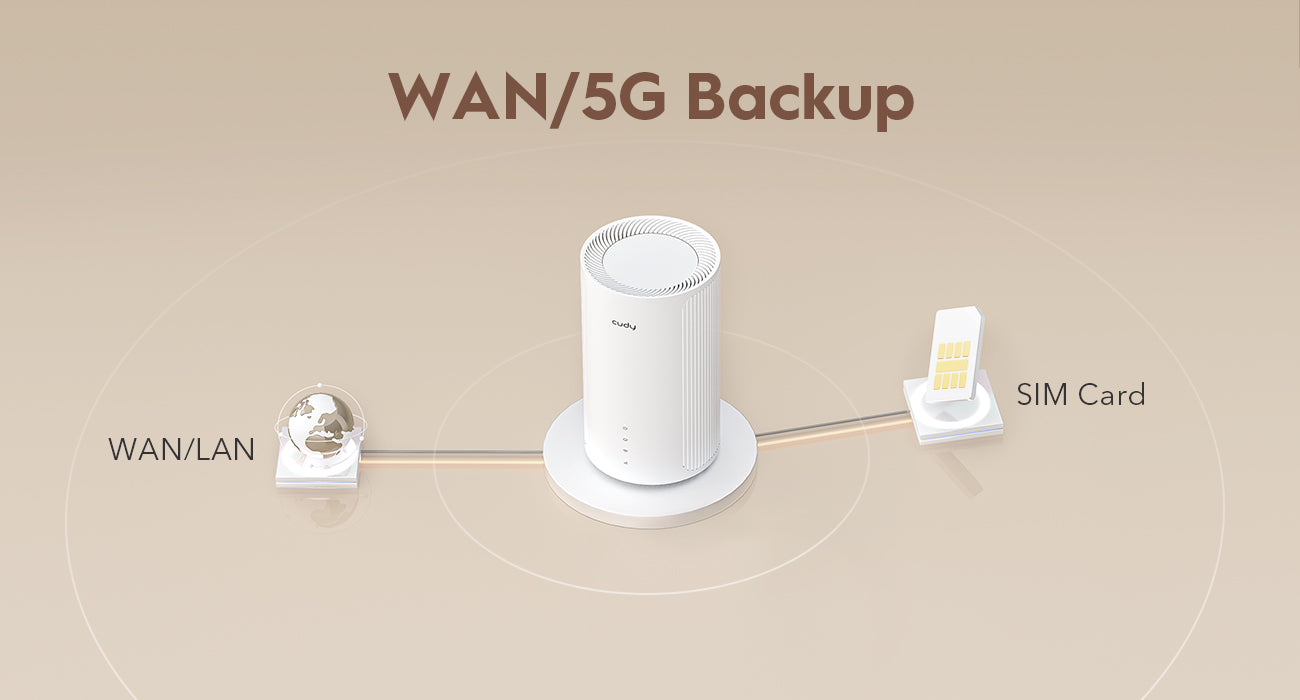
Keep You Connected

Aplicación Cudy

Aplicación Cudy
| Versión del modelo | ||
|---|---|---|
| Versión del modelo | P4 1.0 | |
| CPU | ||
| CPU | Chipset | IPQ5018 |
| CPU Details | 1.0 GHz Dual-core, ARM Cortex-A53 | |
| Memory/Storage | ||
| Memory/Storage | Flash/ROM | 128 MB (1 Gbit) NAND |
| DDR/RAM | 512 MB (4 Gbit) DDR3 | |
| Cellular | ||
| Cellular | Cellular Standards |
|
| Cellular Antennas | 6× Internal, 2× SMA Connectors for Customized Antennas | |
| Detachable Cellular Antennas Connector | SMA Female | |
| SIM Options | 1× Nano SIM Slot, eSIM (optional) | |
| Available Versions | EU | |
| EU Version Cellular | ||
| EU Version Cellular | Suitable Region | Europe, Middle East, Africa, Asia-Pacific (Exc. JP, CN), Brazil |
| Max DL Speed | 3.4 Gbps (NSA), 2.4 Gbps (SA) | |
| Max UL Speed | 550 Mbps (NSA), 900 Mbps (SA) | |
| Advanced | DL/UL 4CA, DL 4×4, UL 2×2 MIMO | |
| Cellular Bands |
5G Sub 6 GHz: n1/3/5/7/8/20/28/38/40/41/71/75/76/77/78 LTE-FDD: B1/3/5/7/8/20/28/32/71 LTE-TDD: B38/40/41/42/43/71 WCDMA: B1/5/8 |
|
| Wireless | ||
| Wireless | 5 GHz Wi-Fi Speed | 2402 Mbps |
| 2.4 GHz Wi-Fi Speed | 574 Mbps | |
| 5 GHz Wi-Fi Streams | 2T2R (2×2 MIMO) | |
| 2.4 GHz Wi-Fi Streams | 2T2R (2×2 MIMO) | |
| Wi-Fi Antennas | Internal | |
| 5 GHz Antenna Gain Max | 6.78 dBi | |
| 2.4 GHz Antenna Gain Max | 4.19 dBi | |
| Beamforming | True | |
| FEM or PA/LNA |
|
|
| Range Performance |
Max: 170 m (558 ft) Indoor WiFi range varies depending on the layout and wall materials. See Wall Performance spec for placement suggestions. |
|
| Wall Performance |
Two wooden walls with thickness < 10 cm (4'') One concrete wall with thickness < 20 cm (7'') |
|
| Interfaces | ||
| Interfaces | Physical Buttons |
|
| Gigabit RJ45 Ports | 3 | |
| Ethernet Notes | One port supports WAN/LAN configuration, and the rest are LAN ports | |
| LED |
|
|
| Power Input | DC Jack | |
| Power | ||
| Power | Power Methods | DC |
| DC | 12V 2.5A | |
| Power Adapter |
Input: 100 ~ 240 V, 50/60 Hz AC Output: 12V 2.5A DC |
|
| Max Power Consumption (W) | 21.7W | |
| Reliability | ||
| Reliability | EMS | ESD: Contact: 4kV; Air: 8kV |
| Environment |
Operating Temperature: 0 ℃ ~ 40 ℃ (32 ℉ ~104 ℉) Storage Temperature: -40 ℃ ~ 70 ℃ (-40 ℉ ~ 158 ℉) Operating Humidity: 10% ~ 90% non-condensing Storage Humidity: 5% ~ 90% non-condensing |
|
| Certifications | ||
| Certifications | FCC, CE | |
| Mechanical | ||
| Mechanical | Dimension |
Φ116×202 mm Φ4.57×7.95 inches |
| Product Weight | 656.0 g (23.14 oz.) | |
| Installation | Desktop | |
| Package Content | ||
| Package Content |
|
|
| Ordering Information | ||
| Ordering Information | Retail Package Weight | EU: 1119.5 g (39.49 oz.) |
| Carton Net Weight | EU: 9.0 kg (19.84 lbs) | |
| Carton Gross Weight | EU: 9.8 kg (21.61 lbs) | |
| Versión del modelo | ||
|---|---|---|
| Versión del modelo | P4 1.0 | |
| Wireless | ||
| Wireless | Wi-Fi Standards | Wi-Fi 6 |
| Max Wi-Fi Modulation | 1024-QAM | |
| Wi-Fi Efficiency |
|
|
| Max Capacity | 256 | |
| Recommended Client Upper Limit | 100 | |
| Max Wi-Fi Channel Width | 160 MHz | |
| Wi-Fi Security | WPA/WPA2/WPA3 | |
| Guest Network | 2.4 GHz, 5 GHz | |
| WPS | True | |
| General | ||
| General | Operation Modes |
|
| Mesh | Cudy Mesh Main | |
| Mesh Backhaul |
|
|
| Cellular APN |
|
|
| Cellular Mode |
|
|
| WAN Mode |
|
|
| Internet Failover Sequence |
|
|
| Network | ||
| Network | QoS | Per-User Rate Limiting |
| DHCP |
|
|
| IP Versions | IPv4/IPv6 | |
| IPv6 Protocols |
|
|
| IPTV/VLAN |
|
|
| TTL Customization |
|
|
| IGMP |
|
|
| Forwarding |
|
|
| Firewall |
|
|
| Application Layer Gateway |
|
|
| Utilities | ||
| Utilities | VPN Server |
|
| VPN Client |
|
|
| DNS Options |
|
|
| DNS over TLS Providers |
|
|
| Wake on LAN | True | |
| Online Detection | True | |
| Management | ||
| Management | All Devices Management |
|
| Per-Devices Management |
|
|
| Content Management |
|
|
| System | ||
| System | LED Control | True |
| Local Control Method |
|
|
| Remote Control Method |
|
|
| Firmware Upgrade |
|
|
| Diagnostic Tools |
|
|
| Languages |
|
|
| Reliability |
|
|
| Dashboard | ||
| Dashboard | Panel |
|
| Charts |
|
|
- El rendimiento de datos inalámbricos real variará como resultado de las condiciones de la red, las limitaciones del cliente y los factores ambientales, incluidos el diseño del edificio, los obstáculos y la ubicación del cliente.






